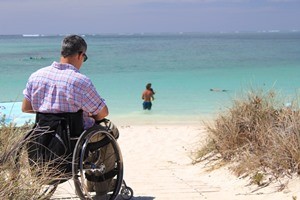
Pixabay
Traveling with a disability can be a challenge but is definitely possible. If you are a person with a disability, you should not let these challenges get in the way or hold you back from exploring the world. There is so much out there for everyone to see and you are not an exception.
Here are some helpful tips to make your trip a comfortable, safe and enjoyable one:
Check with your doctor.
First thing’s first, consult your doctor and make sure that you are fit to travel. Before your trip, make another visit and have a final physical check-up and get the necessary prescriptions for your maintenance (if you already have one) and emergency medications. Make sure you have your doctor’s contact number when traveling for emergency situations.
Do your research.
When searching for a destination, it is best to narrow down your options to places that are most accessible for people with disability. But that doesn’t mean that you should just limit yourself to those places or stop yourself from going to a certain place on your bucket list just because it is not wheel-chair friendly or whatever. That’s why research is very important to know where to go, what to see, who to call and what the place can provide. In most countries, service providers are required by law to accommodate travelers with special needs.
Plan ahead.
Once you have your destination set, it’s time to start planning.
There are specialized travel agencies and tour operators that can help arrange your transportation, offer specialized services, and even have someone or a travel nurse assist you during your trip. So if you want to make use of this service, call ahead and make reservations because this type of arrangement can take time.
When booking your flight, inform the airline ahead of time and request assistance to ensure an easy, safe and fast airport-situation.
Book hotels and other services in advance. Inform them about your disability and your needs so that they can choose a room that is best for you. Also, don’t wait until you reach your accommodation to make arrangements for a wheelchair, a specific vehicle or additional medical equipment. Settle everything before you travel.
Plan your route. It is best to have a route planned ahead when seeing tourist attractions. Check the accessibility of sidewalks, transportation routes, wheelchair ramps, etc.
Travel insurance.
There are different travel insurance options for disabled people so make sure to get one. This can cover loss of medications, cover for mobility aids/equipment and even a 24-hour medical emergency service.









